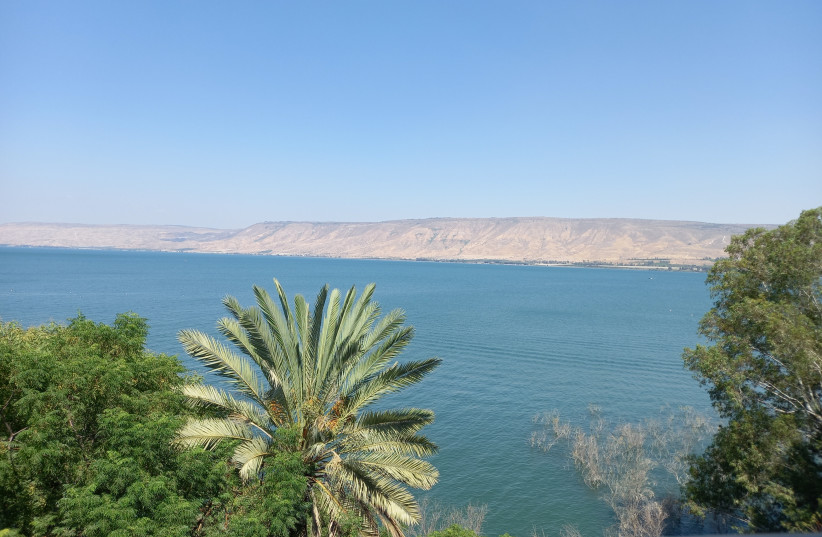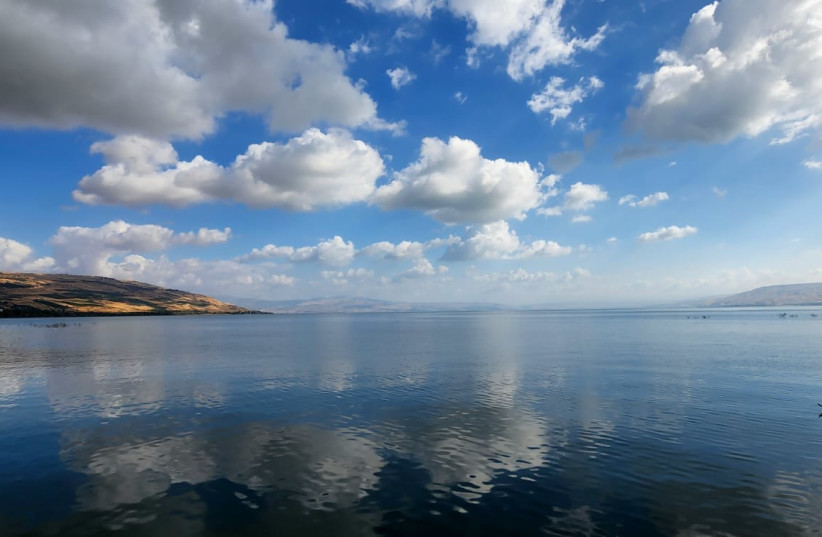Consider it a reversal of fortune, or at least a drastic change in direction. For decades, the Sea of Galilee (the Kinneret) was considered the country’s main reservoir and water was pumped out into the National Water Carrier. Now, literally going against the flow, the Mekorot national water company and the Water Authority have launched the “Reverse Water Carrier,” a major project under which desalinated water from the Mediterranean Sea will be pumped into the Kinneret.
The NIS 1 billion undertaking is being hailed as one of Israel’s most significant infrastructure programs in recent years and is aimed at maintaining the level of the Kinneret even in years when rainfall is low.
According to Mekorot, the idea of pumping desalinated seawater in the opposite direction of the National Water Carrier’s route, came about following years of drought between 2013 and 2018. This resulted in the level of the Kinneret steadily dropping until it reached the “Black line,” some 215 meters below sea level, the threshold at which water could no longer be pumped out.
Most of the country’s tap water now comes from desalination plants rather than the Kinneret, but the Sea of Galilee still has an important role as an emergency reservoir, as a source of water for agriculture and from an environmental viewpoint.
It is somewhat of a national sport to follow the highs and lows of the level of water in the Kinneret with regular updates on the situation. Its fluctuations receive similar attention to those of the stock market – with added emotional value.

The Reverse Water Carrier is a very expensive endeavor that hopefully won’t have to be used too often. Consider it a kind of insurance policy. When the Kinneret is high, as it was this summer, there will be no need to pump water into it. Indeed, another national pastime is guessing whether the Degania dam on the Jordan River will need to be opened to let water flow out southwards to prevent flooding around the lake.
Mekorot officials noted that there is also a geopolitical aspect to the program (isn’t there always in this region): Even during years of drought, Israel supplies water from the Kinneret to Jordan under the terms of the peace agreements signed between the two countries. Reflecting the water paucity in the Hashemite Kingdom, recently, the water supply to Israel’s eastern neighbor was doubled to 100 million cubic meters per year, underscoring the need to maintain the Kinneret’s water level both as a matter of course and in emergency situations.
“This is a historic project that will be recorded in the annals of the Israeli water sector,” Mekorot chairman Yitzhak Aharonovich was quoted as saying in a Jerusalem Post article on December 28.
Mekorot CEO Amit Lang added: “Mekorot, together with Mekorot Shacham, have once again proven that they can initiate, plan and execute innovative and groundbreaking solutions, and there is no task that cannot be performed.”
It is classic Israeli out-of-the-box thinking. You can’t always just go with the flow. Israel is, after all, a worldwide leader in desalination projects. Part of the credit for the Reverse Water Carrier concept goes to philosopher-turned-politician Yuval Steinitz who promoted the plan four years ago when he was Minister of National Infrastructures, Energy and Water Resources.
According to press reports, the first stage of the project which was concluded this week, includes the 30-kilometer pipeline from the Eshkol Site pumping station to the Nahal Tzalmon area. In the second stage, four pumping stations and pools will be built in the Rosh Ha’ayin area, to convey excess water from new desalination plants, boreholes and other sources via the existing National Water Carrier. It will take a few years, but once completed, the project should allow for the pumping some 120 million cubic meters of water per annum into the Kinneret.
Because the water comes from the coastal desalination plants, Mekorot believes it won’t affect the natural environmental balance in the Kinneret’s sweet waters. (Plans to pump Mediterranean or Red Sea waters into the dying Dead Sea would have a far more severe environmental impact, experts say.)
Perhaps the major challenge in the future will not be preserving the level of the waters in the Kinneret but preventing pollution from surrounding agriculture, sewage, nearby construction and boating and recreation activities.
The Kinneret has always had a special place in history and legend, way out of proportion to its size of some 165 square kilometers. Talmudic legend claimed “God made the Seven Seas, but the Kinneret is His delight.” For Christians, it is the place where Jesus started his ministry and where tradition has it that he walked on the waters.
In August, I made a day trip to the area. After years of drought, the Kinneret was full, and as beautiful as ever. No wonder so many songs have been written about it.

The Kinneret project brought to mind one of the poems by Rachel Bluwstein, known as “Rachel the Poetess,” which later became a popular song. Written in 1927, it is full of the sense of loss of the young woman who, due to illness, was forced to leave the agricultural training center at Kinneret Courtyard and move to Tel Aviv. Usually referred to as “Kinneret sheli,” “My Kinneret,” its real title is “Ve’ulai,” “And perhaps.” The refrain goes: “...Kinneret, Oh my Kinneret, did you exist, or was it just a dream?”
In the words of singer-songwriter Joni Mitchell, “Don’t it always seem to go, that you don’t know what you got ’til it’s gone?” With the Kinneret every drop counts.
The news footage of flowing waters at the inauguration of the first stage of the Reverse Water Carrier project this week flooded me with memories. In 1994, I attended the modest but moving ceremony when history took a step backwards and water began to flow again into the Hula Valley, drained so laboriously by pioneers 40 years earlier as they tried to eradicate malaria.
The restoration project was the initiative of the Jewish National Fund, the Agriculture Ministry, the Israel Lands Administration and local authorities in the region. The result is the breathtaking bird sanctuary and nature reserve which is worth a visit, particularly if you’d like to know how it feels to be in the setting of a David Attenborough-type documentary.
THE REVERSE Water Carrier project is in many ways a sign of the times – times when, call it what you want, climate extremes are playing havoc with life the world over.
I hardly dare complain of the heavy rains and flooding that hit Israel this week, given the great freeze that struck North America. A new immigrant commented on how Israel comes to a halt in heavy rainfall, let alone light snowfall, whereas rocket attacks and wars don’t faze us.
The country is not built for serious downpours: There is insufficient drainage infrastructure and as more concrete tower blocks and urban construction goes up, rainwater has less open ground where it can be absorbed.
In one of the most haunting incidents, a couple drowned in the elevator of their Tel Aviv apartment building when the underground parking lot flooded in January 2020.
A prayer for rain
Long before “climate change” became a catchphrase and images of droughts and floods were carried around the world courtesy of social media, praying for the right amount of rain came, well, naturally. In the words of the prayer recited at the end of Sukkot in the autumn, we ask God to send us rain and wind:
“For a blessing and not for a curse.
“For life and not for death.
“For plenty and not for lack.”
Amen to that.
As I write these lines, it seems that Likud MK Idit Silman will be the country’s next environment minister. I hope she takes the job seriously. The environment portfolio might not be prestigious, but it is important.
Part of the problem with the political instability of recent years is that ministers don’t always dare think up long-term plans. They prefer something immediate where they can be photographed cutting a red ribbon, rather than risking that a successor will reap the fruits and glory of their labor.
That’s another reason the Reverse Water Carrier project is significant. Time will tell how successful the Kinneret project ultimately is, but this week was definitely a watershed moment.
